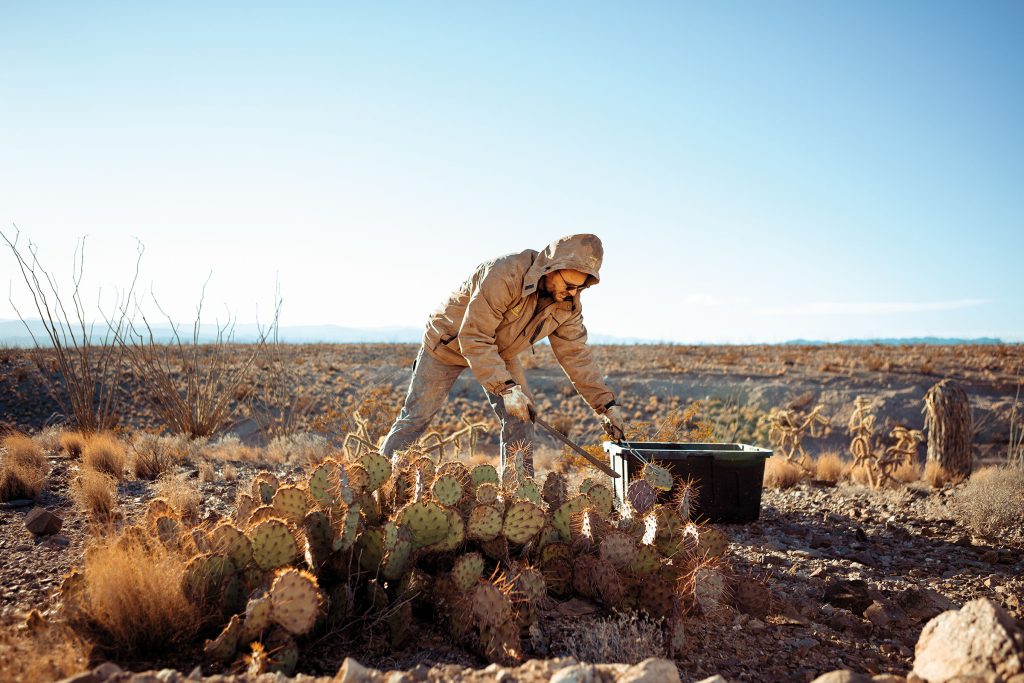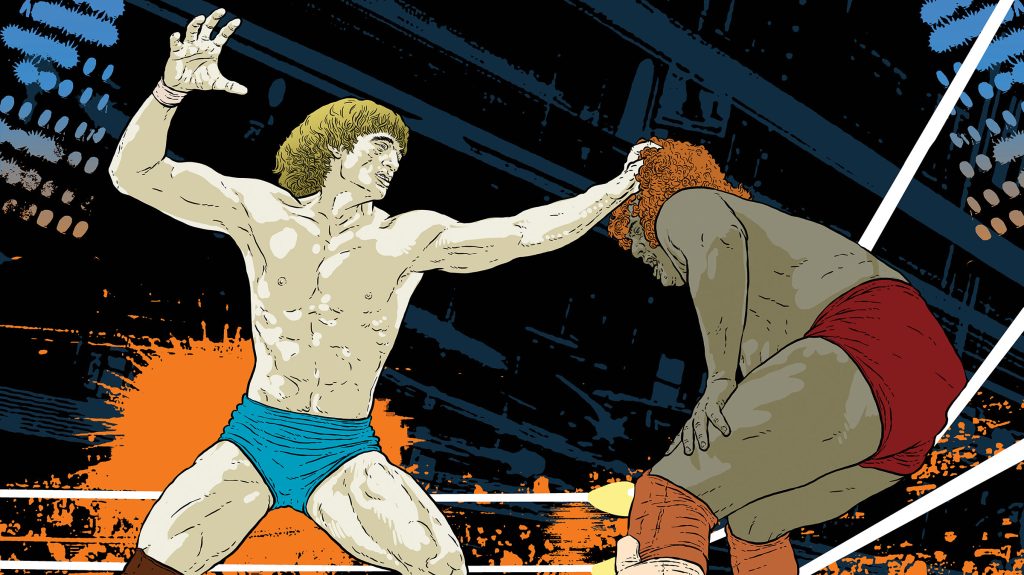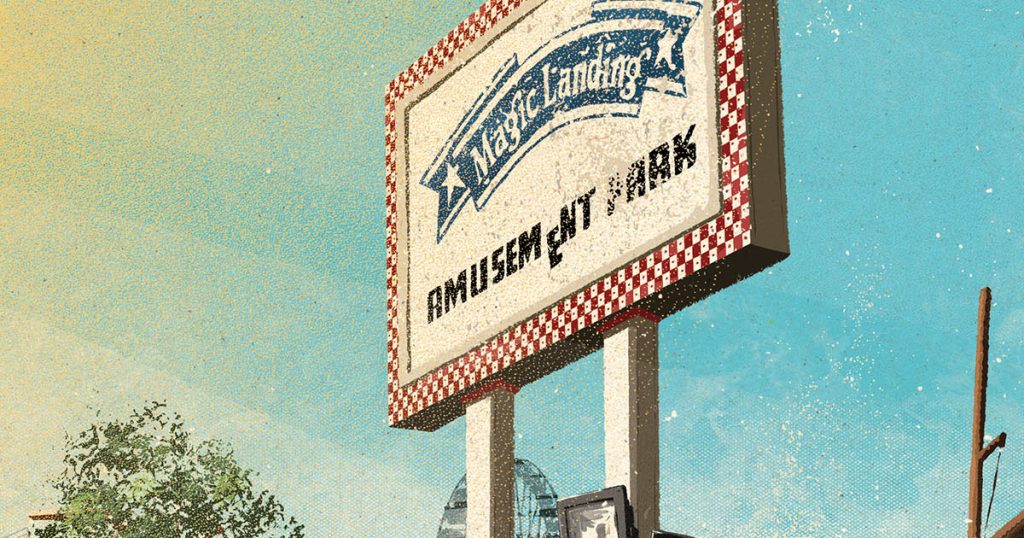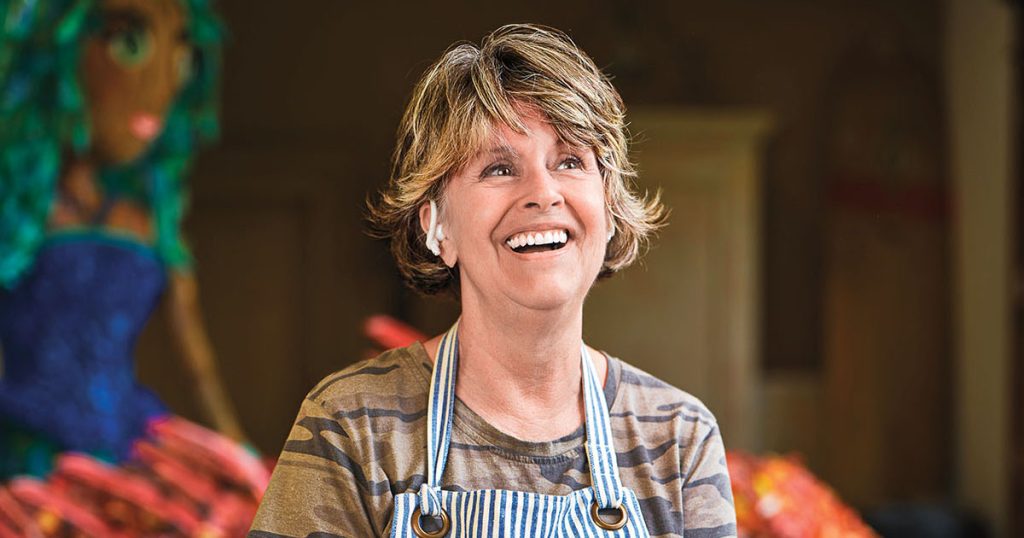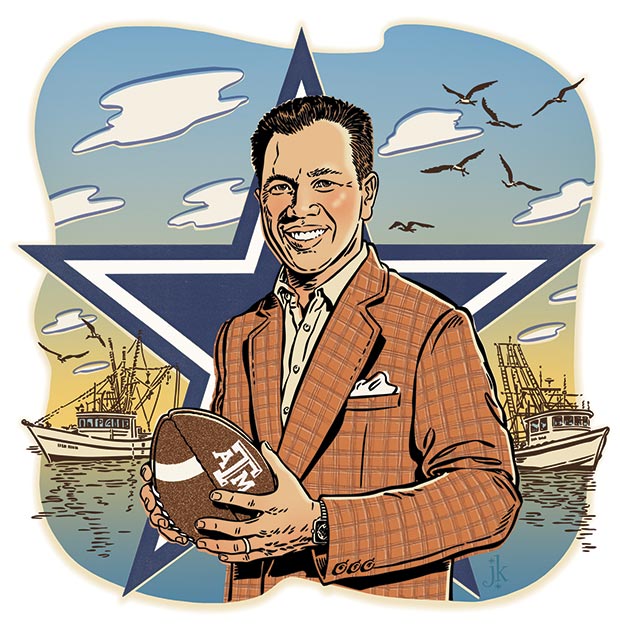
Illustration by John Kachik
Dat Nguyen holds the distinction of being the first and only Vietnamese-American to play in the National Football League. And he’s got a life story to match that accomplishment.
Born in 1975 in an Arkansas refugee camp, Nguyen grew up in a Catholic Vietnamese shrimping family in Rockport. He joined the Rockport-Fulton Junior High football team in eighth grade and, despite his parents’ skepticism, found his calling.
“I fell in love with the game,” he says. “The most intriguing thing to me about football is that everything is so challenging—the lineups, making a tackle, going out there and running or catching the football. The execution part was really the drive that got me interested.”
As a linebacker at Texas A&M from 1995 to 1998, Nguyen won a host of awards, including his induction this year into the College Football Hall of Fame. In the NFL, he started six seasons as the Dallas Cowboys’ middle linebacker before retiring in 2006.
Nguyen served coaching stints with the Cowboys and the Aggies before leaving the game. Last year, he became proprietor of the Chick-fil-A restaurant at Montgomery Plaza in Fort Worth.
All this for a child who was in his mother’s belly when the family fled Vietnam by boat, under fire, on the night the Viet Cong captured Saigon. Today, the 41-year-old Nguyen lives in Grapevine with his wife, Becky, and their five children, ages 2 to 13.
Q: How did football lead to Chick-fil-A?
A: I wanted to coach football, no doubt about that. The only thing I didn’t like about coaching was the potential of moving my family around the country, and there was a little bit more politics than I thought going in. When you’re a coach, you’re impacting young people’s lives, giving them a chance to pursue a dream. I wanted to do something where I could impact other people on a daily basis. That’s why I decided to do the restaurant business with Chick-fil-A. You’re building a team. I have about 65 to 70 employees; about 45 to 50 of them are 19 or younger. So I’m having a chance to touch a lot of these kids’ lives and teach them life skills. I use all the football concepts—impacting, motivation, awards. The only things we don’t do are gassers and up-downs and stuff like that that’s physical punishment.
Q: How did your family manage to escape Vietnam?
A: My dad was fortunate to be in a position that he could afford a radio, and he knew a couple of people on the inside who knew what was going on with the Viet Cong. And my dad coordinated a boat to take our family and to give us a chance to get away to have a life in America or another country, wherever it was. They had five kids, and my mom was four-and-a-half months pregnant with me. You talk about courage, just taking a leap of faith. I don’t know if I have enough courage to do that now.
Q: How did your parents choose Rockport?
A: My relatives were distributed on the Gulf Coast where they did the shrimping industry, which they did in Vietnam. And so we decided to move south, and my mom’s family members were in Rockport. What’s ironic is we lived in a small village south of Saigon called Bin Da. The translation of Bin Da is Port of Rock.
Q: Hu-Dat in Rockport is your family’s restaurant?
A: My mom started the restaurant. When my brother turned 20 years old, my dad built him a shrimp boat. And my dad had a shrimp boat himself. And they’d usually start about 4 o’clock in the morning. My mom would make coffee before they left, and at 1 or 2 o’clock in the afternoon when they got back, she would be making sandwiches or meals. During that transition, my dad sold his boat and built a marine supply, which is what he did in Vietnam. He would sell shrimp nets, pulleys, cables, ropes, whatever they needed on the shrimp boat. The shrimpers would go there and buy stuff from dad and eat a meal from mom. My mom thought, “I’m doing this every day; I might as well make it into a restaurant.” That’s how Hu-Dat started.
I remember fifth grade, sixth grade, seventh grade, every summer I had to be on the shrimp boat. … When I fell in love with football, I said I never want to get back on a shrimp boat again in my life.
Q: What do you like at Hu-Dat?
A: You can’t go wrong with the traditional food, the rice and the pork. I like the pork chops. Then you have to go to my sister’s place in Corpus Christi, HU-DAT Noodle House (6418 S. Staples St.). She has the Dat Nguyen Special. It’s called the Shaken Beef. It’s cubed beef marinated with oyster sauce and pepper and a little bit of soy sauce, and it’s laid on top of tomatoes, onions, and lettuce, and then you eat it with a bowl of rice.
Q: Did Hu-Dat influence your interest in the restaurant business?
A: Absolutely. I saw how it worked. We started Hu-Dat in 1993 when I went to college, and every time I came back in the summer, I would work for my mom. I was a dishwasher, a busboy.
Q: Did you ever work on a shrimp boat?
A: Oh yes. I was my brother’s deckhand. I remember fifth grade, sixth grade, seventh grade, every summer I had to be on the shrimp boat. We’d leave at 4 o’clock in the morning, and you don’t have a life. So that was the last thing I wanted to do. When I fell in love with football, I said I never want to get back on a shrimp boat again in my life.
Q: Where does your family like to vacation in Texas?
A: We love Marble Falls. We go up there to the Bluebonnet Café, of course. There’s a little Thai place, Ginger and Spice, right downtown where we always eat; it’s very good. Austin is one of our favorite places. We love to go see the bats with the kids. My wife loves the outdoors. Now that we have these 2-year-olds it’s a little bit harder, but before that we’d go down to Barton Springs and swim. We like to go down to College Station, and you have to hit up the famous Wings ’N More. Those might be the best chicken strips in
the country.
Q: What do you like to do in Rockport?
A: I spend time with my mom and my dad. [Dat’s father, Ho Nguyen, passed away in April.] You miss the home cooking of course. And it depends on the mood of my friends. There’s a new sports bar that popped up called Benchwarmers. They’ve got fabulous wings, and they’ve got great fried oysters as well. If I’m wanting crawfish, I run down to the Boiling Pot. Everybody knows about the Boiling Pot. They spread out the paper on the table and then dump the food on the table and you just eat—crawfish, shrimp, sausage, you name it.
Q: How has your family’s immigrant experience influenced you?
A: It shaped who I am. The adversity, the opportunity, the dedication, having a dream, having a vision. You saw it in my parents coming over here for an opportunity, having faith, and never knowing when that oppor-tunity was going to be. You think about my career at Texas A&M. I was the backup linebacker my freshman year. Leading up to the first game against LSU, the starter stepped on a sprinkler head. He twisted his ankle and couldn’t play. That’s how my career started. I had worked so hard to be in that position, I knew I wasn’t going to give it up. My parents are the reason I am who I am today. I’m thankful and grateful for the opportunity, and now I get a chance to impact other people. In the Bible, Jesus said, “Come follow me, and I will make you fishers of men.” And that’s what we’re supposed to do—have a purpose. I try to walk that path each and every day and try to impact people to have a better chance, a better life, and to fulfill their dreams.
